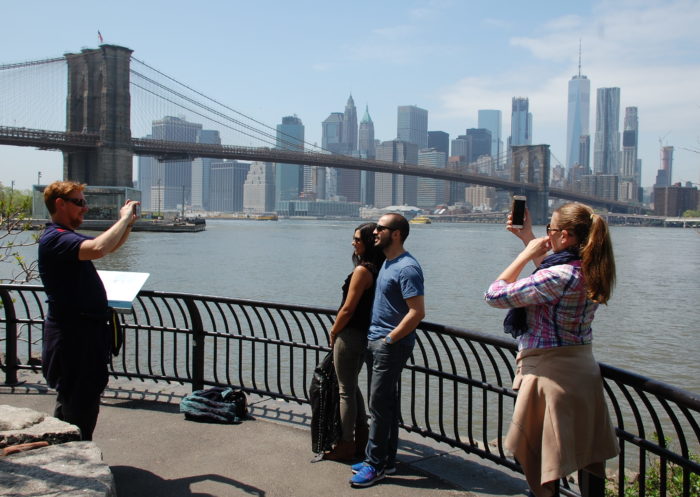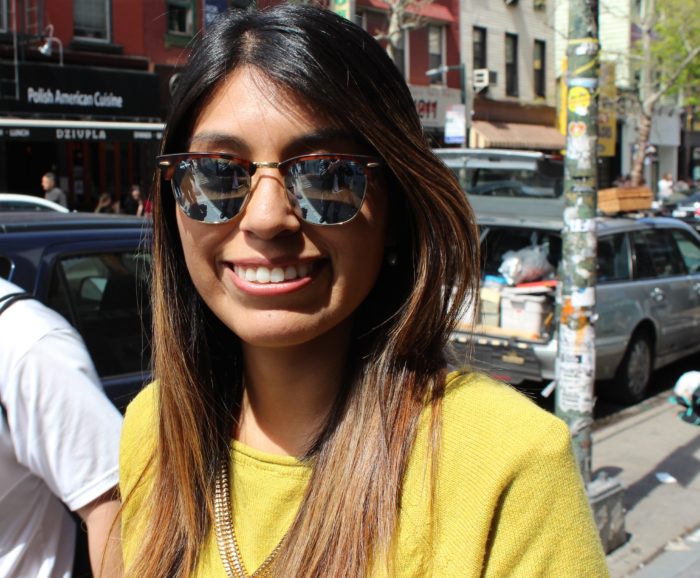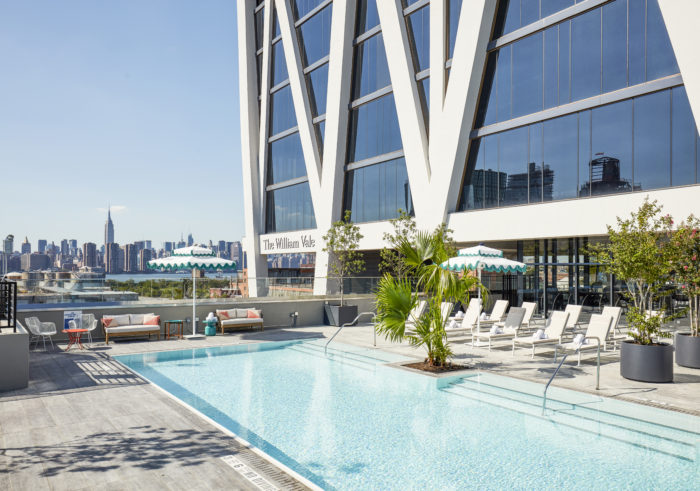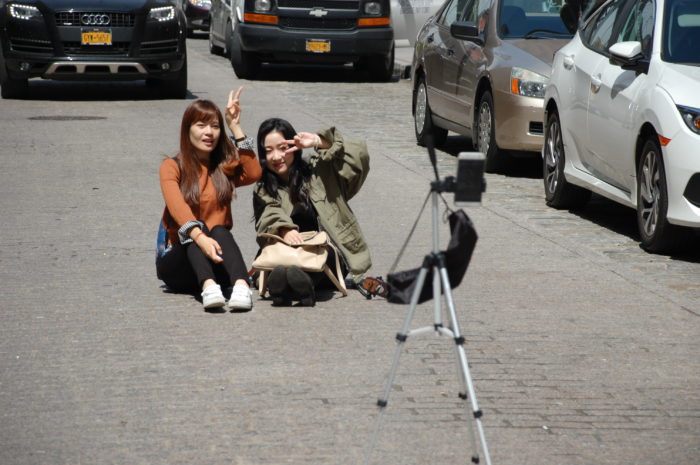The Trump Effect: Its Impact on Brooklyn Tourism
The borough's booming hospitality business is likely to take a hit from the immigration crackdown
A visiting couple from Australia offers help taking snapshots in Brooklyn Bridge Park (Photo by Steve Koepp)
Jackie Nunez diligently spritzes and wipes the lenses of the sunglasses and other jewelry that fill the table stand she operates on the northeast corner of Bedford and North 6th Street in Williamsburg. It’s a good day for her business, a Sunday that sees a lot of foot traffic off the nearby L train stop as well as abundant sun inspiring passersby to give her wares a look.
The 59-year-old naturalized citizen from the Dominican Republic has been selling jewelry in Brooklyn for more than 25 years. Her table stand in Williamsburg is very dependent upon foreign tourists for business, she said. And this year she is concerned that business will suffer. “I feel that there are less Europeans,” she said. “Because usually for the Easter week, this particular neighborhood is inundated with Europeans.”

Christina Caggiano, visiting Brooklyn recently, worries about getting a visa for her boyfriend for the next visit (Photo by Patrick Smith)
At the weather warms up and the start of tourist season approaches, Brooklyn’s emerging hospitality industry is feeling a chill. President Trump’s immigration policies, including travel bans and a perceived hostility to foreigners at border crossings, has sent a discouraging word to prospective foreign visitors. New York City’s tourism agency, NYC & Co., predicts that the number of international visitors will drop by 300,000 this year, after earlier predictions of 3% growth. The negative swing could cost the city $1.4 billion in revenue, the agency reported.
While foreigners amount to just 20% of visitors to the city, they account for more than half of all tourist spending. “If the United States is perceived as hostile, or if visitors lose confidence with our entry process or are unfairly denied entry, they will choose to spend their money visiting and exploring destinations in other countries that are easier to enter, welcoming, and inclusive,” said Donna Keren, vice president of NYC & Co., in a press briefing. “Important travel destinations like New York City would suffer disproportionately.”
Until this projected downturn, New York City tourism had been on the rise, growing about 3% annually over the past five years and topping 60 million visitors in 2016. Brooklyn has been part of that boom. Tourism is the second-fastest growing industry in the borough (after health care), accounting for nearly 15% of the new jobs created in 2015, according to an economic report for the Brooklyn Chamber of Commerce. Brooklyn’s innovative restaurants have proliferated and luxury hotels have sprung up, putting the borough on the global must-see list. More than $400 million has been invested in nine new hotels in Downtown Brooklyn alone.
Brooklyn now has the infrastructure to attract business travelers as well as tourists, but those visitors could be discouraged by the Trump Administration’s actions too. Greeley Koch, executive director of the Association of Corporate Travel Executives, said the group conducted a survey in which 39% of companies expected to reduce business travel after the travel ban, he told the New York Daily News. “Business travelers abhor uncertainty. When travelers are uncertain about the viability of a trip, it gets postponed. That means postponing the hotel stay, the dining, the surface transportation charges, the shopping,” he said.

Poolside at The William Vale hotel in Williamsburg, one of Brooklyn’s wave of new luxury hotels (Photo courtesy of The William Vale)
Damien Selosse, a French citizen, told CBS News that he has been visiting the U.S. for 30 years but canceled plans to attend an April conference in Brooklyn. “I don’t want to spend any of my euros in this version of United States. It’s not the one I’ve known for long time,” he said. “Maybe an opportunity to visit Australia or New Zealand.”
Countries most likely to send visitors to the U.S. were not named in the Trump travel ban, but three of the top ten (Mexico, China and Germany) have all had to endure unkind rhetoric from President Trump at one point or another. While his comments may be off-putting for some, for others it doesn’t matter. Brooklyn is awesome and they’re going to come here anyway. Diego Ramos, who was visiting from Spain last month on his first trip to the U.S., told The Bridge his passage into the country was fairly smooth. Manhattan, he said, “smells a bit funny in the subway,” but he was impressed with how “neighborhooding” Brooklyn felt.
Before departing on his trip, however, the American political climate made him a bit anxious. Since Trump’s inauguration, “you hear things and you see things and, yeah, it doesn’t give you a very good vibe for coming [to the U.S.],” Ramos said. He was even a bit hesitant to speak Spanish in public for fear of how he would be viewed.

Taking advantage of a favorite photo spot on Washington Street in Dumbo (Photo by Steve Koepp)
Christina Caggiano, visiting Brooklyn from Buenos Aires, has had a U.S. visa for several years and had no hassles on her current trip, she said. But she fears a future trip to Brooklyn with her boyfriend might be in jeopardy because she is not sure he would be able to get the same visa status.
Caggiano and Ramos illustrate a real issue for the U.S. travel industry, even among visitors from countries who are not under heightened scrutiny. Their anxieties suggest that people who feel uncomfortable with the general tone may choose to spend their leisure dollars elsewhere. After all, there’s always another “new Brooklyn” around the corner.













